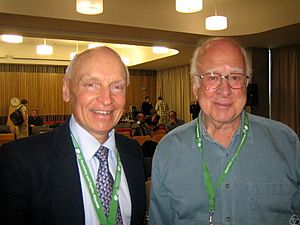David Wallace (physicist) facts for kids
Quick facts for kids
Sir David Wallace
|
|
|---|---|

David Wallace (left) and Peter Higgs
|
|
| 6th Master of Churchill College, Cambridge | |
| In office 2006–2014 |
|
| Preceded by | John Boyd |
| Succeeded by | Athene Donald |
| Personal details | |
| Born |
David James Wallace
7 October 1945 |
| Spouse |
Elizabeth Anne Yeats
(m. 1970) |
| Awards |
|
| Education | Hawick High School |
| Alma mater | University of Edinburgh (BSc, PhD) |
| Scientific career | |
| Institutions | University of Cambridge Princeton University University of Southampton Loughborough University University of Edinburgh Edinburgh Parallel Computing Centre Harrow School Institute of Physics |
| Thesis | Applications of current algebras and chiral symmetry breaking (1971) |
| Doctoral advisor | Peter Higgs |
| Doctoral students | Christopher Bishop Neil Gunther |
Sir David James Wallace, born on October 7, 1945, is a famous British physicist and academic leader. He has received several special honors, including the CBE, FRS, FRSE, and FREng, which show his important contributions to science. He was the Vice-Chancellor of Loughborough University from 1994 to 2005. Later, he became the Master of Churchill College, Cambridge, serving from 2006 to 2014.
Contents
Early Life and Education
Growing Up in Scotland
David Wallace was born in 1945. He grew up in Hawick, Scotland. He attended Hawick High School for his early education.
University Studies
After high school, David went to the University of Edinburgh. There, he studied Mathematical physics, which combines math and physics. He also earned his PhD in Elementary particle theory. This field studies the tiny building blocks of the universe. His PhD supervisor was the well-known physicist Peter Higgs.
Career Highlights
Starting His Research Journey
After finishing his PhD, David Wallace received a special scholarship called a Harkness Fellowship. This allowed him to do research at Princeton University in the United States. In 1972, he returned to the UK. He became a physics lecturer at the University of Southampton.
Professor and Award Winner
In 1979, David Wallace became the Tait Professor of Mathematical Physics at the University of Edinburgh. This was a very important position. He also won the James Clerk Maxwell Medal and Prize in 1980. This award recognized his excellent work in physics.
Leading in Computing
David Wallace also became the Director of the Edinburgh Parallel Computing Centre (EPCC). This center focuses on using powerful computers for research. For his important work in computing, he was given a special honor in 1996. He was appointed a Commander of the Order of the British Empire (CBE).
Leadership Roles in Science
Sir David Wallace has held many leadership roles in the world of science. He is currently the Vice-President for Physical Sciences of the Royal Society of Edinburgh. He became a Fellow of this society in 1982. He also served as Vice-President and Treasurer of the Royal Society. This is one of the oldest and most respected scientific organizations. He also chaired the Council for the Mathematical Sciences.
University Leadership
From 1994 to 2006, he was the Vice-Chancellor of Loughborough University. This means he was the main leader of the university. After that, from 2006 to 2011, he directed the Isaac Newton Institute for Mathematical Sciences in Cambridge. He has also been the President of the Institute of Physics. He was elected a Fellow of the Royal Academy of Engineering in 1998.
Honoring His Contributions
In 2014, the Department of Mathematical Sciences at Loughborough University started a series of public lectures. These "Sir David Wallace lectures" honor his contributions to the university and science. Famous scientists like Cédric Villani and Michael Berry have given talks in this series.
Personal Life
David Wallace married Elizabeth Yeats in 1970. They have one daughter named Sara.
 | Aaron Henry |
 | T. R. M. Howard |
 | Jesse Jackson |

